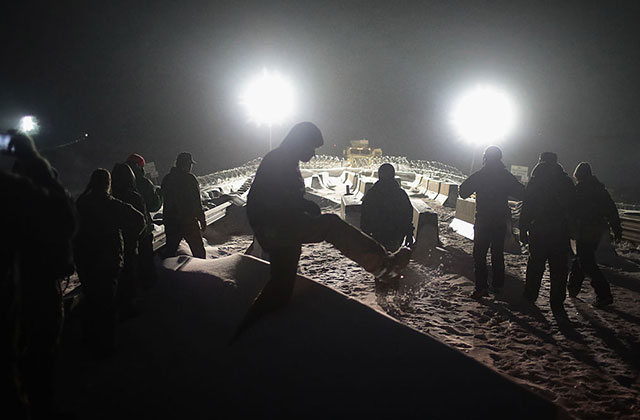Over the weekend, investigative outlet The Intercept released a flurry of documents it obtained related to the Dakota Access Pipeline and the months-long standoff near the Standing Rock Sioux Tribe reservation against the pipeline.
These documents showed that pipeline developer Energy Transfer Partners hired TigerSwan, a private security firm that originated as a U.S. Department of State contractor, as part of “counterterrorism tactics” the energy company used against pipeline opponents.
Internal communications also show the firm comparing “water protectors” (how pipeline activists refer to themselves) to jihadist fighters. The reports links to several documents, some of which include situation reports from TigerSwan, as well as daily intelligence reports detailing what their surveillance uncovered relating to the #NoDAPL protests and camps. The firm used helicopters and drones to get aerial views of the camps and organizers.
Here, three key takeaways from The Intercept’s exposé.
TigerSwan was born out of the war on terror.
The mercenary and security firm based in Apex, North Carolina, came about in 2007 after retired military members decided to enter the private security and intelligence industry. It describes itself as an organization that can provide “stability” amid growing daily terror threats.
The business launched during the height of the war in Iraq, where TigerSwan still has an office. Its offices are scattered throughout the Middle East in Afghanistan, Jordan, Saudi Arabia and Libya.
The private business has worked closely with the State Department in the past: The total worth of U.S. government contracts adds up to nearly $60 million. The firm also has ties to the oil and gas industry via its Board of Advisers. Board member Charles Pittman has more than 24 years of experience in the industry.
The public already knew that TigerSwan was behind Dakota Access intelligence when The DeSmogBlog Project, a news outlet dedicated to covering climate change, reported such back in October. Now, however, the public knows of what that intelligence consisted. And a lot of the communications compare the nonviolent protests in North Dakota to the wars in Afghanistan and Iraq.
Its tactics included infiltration and a social engagement plan.
TigerSwan inserted undercover people into camps and activist circles. The Intercept describes these tactics as TigerSwan agents using false names and identities “to obtain the trust of protestors, which they used to gather information they reported back to their employer.”
The documents The Intercept obtained make it clear that TigerSwan personnel spent time inside the camps where the bulk of organizing happened. The firm knew of activism magazines in the camp and would reference “sources in the camp.” There is also an explicit mention within a report of the firm planning to infiltrate a Chicago protest group: “TigerSwan collections team will make contact with event organizers to embed within the structure of the demonstration to develop a trusted agent status to be cultivated for future collection efforts.”
Part of these efforts also involved protecting the pipeline’s reputation—at the detriment of the movement. The firm monitored news coverage of the pipeline and its opponents to ensure that Energy Transfer Partners remained “the good guys” in the narrative. In addition, TigerSwan developed an information campaign to skew public perception in the pipeline’s favor.
Water protectors have been saying this since they met law enforcement resistance.
Those heavily involved in the movement took to social media to share their thoughts on The Intercept’s investigation. None were surprised by it, but they were glad to see that evidence now supports their claims. Here are some examples:
The Intercept interviewed Cody Hall, a water protector named in the TigerSwan reports. He says he knew he was being followed, and that it always scared him. In the past, water protectors have speculated if these infiltrators were behind internal disputes to make the movement take a more aggressive stance when the tribe wanted it to remain peaceful and nonviolent. The Intercept didn’t report on any evidence of whether TigerSwan was behind any alleged violence aimed at law enforcement.
Read the full investigation and accompanying documents here.
